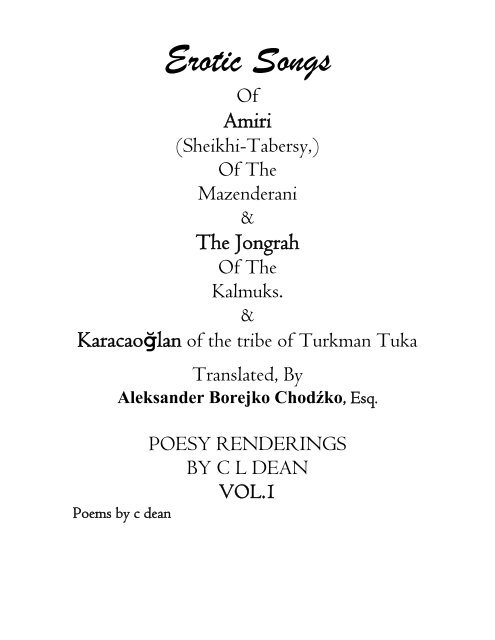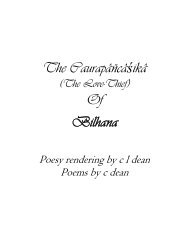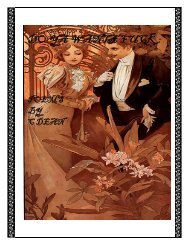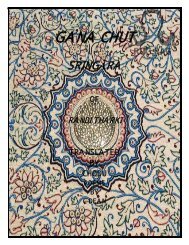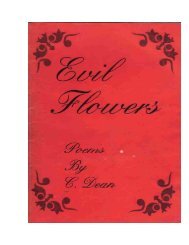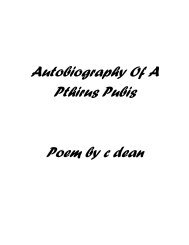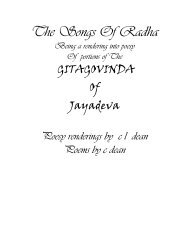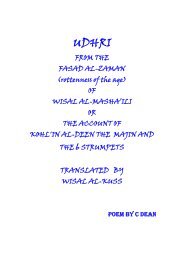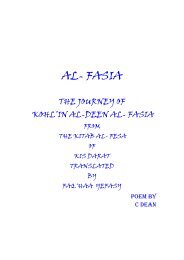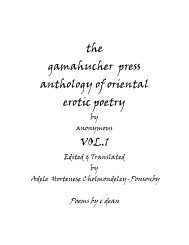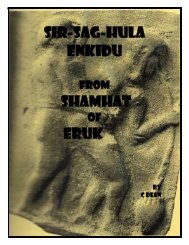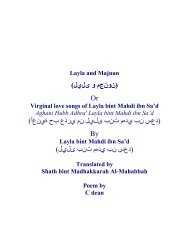Erotic Songs - Gamahucher Press - Home
Erotic Songs - Gamahucher Press - Home
Erotic Songs - Gamahucher Press - Home
- No tags were found...
You also want an ePaper? Increase the reach of your titles
YUMPU automatically turns print PDFs into web optimized ePapers that Google loves.
<strong>Erotic</strong> <strong>Songs</strong>OfAmiri(Sheikhi-Tabersy,)Of TheMazenderani&The JongrahOf TheKalmuks.&Karacaoğlan of the tribe of Turkman TukaTranslated, ByAleksander Borejko Chodźko, Esq.POESY RENDERINGSBY C L DEANVOL.1Poems by c dean
<strong>Erotic</strong> <strong>Songs</strong> 1IIOfAmiri(Sheikhi-Tabersy,)Of TheMazenderani&The JongrahOf TheKalmuks.&Karacaoğlan of the tribe of Turkman TukaTranslated, ByAleksander Borejko Chodźko, Esq..POESY RENDERINGSBY C L DEANVOL.1Poems by c deanList of free <strong>Erotic</strong> Poetry Books by <strong>Gamahucher</strong> <strong>Press</strong> by colin leslie dean Australia'sleading erotic poet free for downloadhttp://www.scribd.com/doc/35520015/List-of-<strong>Erotic</strong>-Poetry-Books-by-<strong>Gamahucher</strong>-<strong>Press</strong><strong>Gamahucher</strong> press west geelong Victoria Australia 20131 From “Specimens of the popular poetry of Persia, as found in the adventures and improvisations of Kurroglou, thebandit-minstrel of northern Persia and in the songs of the people inhabiting the shores of the Caspian Sea (1842)”Orally Collected And Translated, With Philological And Histoeical Notes by Alexander Chodzko, Esqand sold by W. H. Allen and co., Leadenhall street; Duprat, Paris; andBuockhaus and co., Leipzig. MDCCCXLII.http://archive.org/stream/cu31924026906168/cu31924026906168_djvu.txt
INTRODUCTIONChodźko Esq 3III2 .By Aleksander BorejkoThe following eighteen songs, written in Mazenderani patois, are selectedfrom the most popular ones of that country, and, with the exception of the16th and 17th, are attributed to their favorite national poet Sheikhi-Tabersy,better known under the nickname of Amiry. His poetical compositions areprized not only in his own country, Mazenderan, but throughout all Persia,where his " divan," or complete works, is easily procured.The Kalmuks, similar to their neighbours the Astrakan Tatars, have theirprivileged national bards, whom they call Jongrah. One of their songssometimes lasts a whole day. I heard them several times in the winter of1830, when on a visiit to the Kalmuk prince Tumen, on the borders of theVolga; but being unacquainted with the language, I was obliged, muchagainst my inclination, to be satisfied with the few following pieces, for thetranslation of which I am indebted to the courtesy of my host.2 From “Specimens of the popular poetry of Persia, as found in the adventures and improvisations of Kurroglou, thebandit-minstrel of northern Persia and in the songs of the people inhabiting the shores of the Caspian Sea (1842)”Orally Collected And Translated, With Philological And Histoeical Notes by Alexander Chodzko, Esqand sold by W. H. Allen and co., Leadenhall street; Duprat, Paris; andBuockhaus and co., Leipzig. MDCCCXLII.http://archive.org/stream/cu31924026906168/cu31924026906168_djvu.txt3 Aleksander Borejko Chodźko (30 August 1804 – 27 December 1891) was a Polishpoet, Slavist, and Iranologist. He was born in Krzywicze in Russia (today's Kryvičy,Belarus), and attended the University of Vilnius. He was a member of the FilaretAssociation and the Institute of Oriental Studies that was attached to the Ministry ofForeign Affairs of the Russian Empire in Saint Petersburg.From 1830 until 1844, he worked as a Russian diplomat in Iran. From 1852 until 1855,he worked for French Foreign Ministry in Paris. From 1857 until 1883 he succeededAdam Mickiewicz in the chair of Slavic languages and literatures in the Collège deFrance.He was a member of the Royal Asiatic Society of Great Britain and Ireland and theSociété de Linguistique de Parishttp://en.wikipedia.org/wiki/Aleksander_Chod%C5%BAko
IVPREFACEOh the dulcet tones of those Karacaoğlan Amiri the JongrahSweet warblings of the nightingales from out of times long ago onthe scented winds go<strong>Songs</strong> of love and woeFrom raptured hearts into passions hot glow the songs us dothrowForgotten trysts veiled by times mistsLovers and loves hidden behind times mists do kissTheir songs echo again to us in their exquisite refrainNames lost in time are song againAgain to life they become againOn the dulcet tones of those Karacaoğlan Amiri the JongrahThey love and sing again
VThe following eighteen songs, written in Mazenderani patois, are selected from the most popular ones of that country,and, with the exception of the 16th and 17th, are attributed to their favorite national poet Sheikhi-Tabersy, better knownunder the nickname of Amiry 4 . His poetical compositions are prized not only in his own country, Mazenderan, butthroughout all Persia, where his " divan," or complete works, is easily procured.4 The most popular poet of modern Mazandarani is Amir of Pazvar (near Babolsar) who lived probably inthe 17th or 18th century. His lyrical-mystical couplets (dobeytis), known as amiris, are widely recited, oftenas songs, throughout Mazandaran. But due to oral nature of this 4 literature, the amiris include manysupplementary poems said by others. Consequently, amiris should be considered a genre rather than thecreation of a single poet. In any case, the poems attributed to Amir Pazvari are once collected under thesupervision of Boris Dorn who published them in the two-volume Kanz al-Asrar (St. Petersburg, 1860- 66).New efforts are underway to recollect and publish the amiris (see below).19th Nineteenth-century Studies Several European travellers and diplomats collected ethnographic andlinguistic data from Mazandaran, e.g. James Fraser's (1826) travel notes that include preciousethnographical data from Gorgan, Ma- zandaran, and Gilan. One of the earliest collections of poemsbelongs to the Polish scholar Aleksander Borejko Chodzko (1842, 1852), whose book (1942) has a sectionon Mazandarani including 17 amiri couplets and two popular songs from Rostamabad (: 568-581, withextensive linguistic comments) with English translation (: 510-517).Another pioneering effort in dialect studies of Mazandaran was by Il'ya Nikolaevich Berezin (1853) whooffers a grammar (I: 75-99), in- cluding the conjugation of 26 irregular verbs (I: 91-95), Mazandaranisentences (II: 13-19), popular songs, including couplets and amiris, with French translation (II: 57-72),The contribution of Boris Andreevich Dorn to the study of Mazandarani is substantial. The best known isKanz al-Asrdr (Dorn 1860- 66), prepared in collaboration with Mirza Shafi' Mazandarani, and consists ofthe following sections: prose translation from Persian (Sa'di's Gulistdn, etc.) to Mazandarani (I: 1-122); onAmir Pazvari (I: 124-129); amiris, i.e. poems attributed to Amir Pazvari (I: 130-160); facetiae (hazlydt) (I:161-164); Amir's divdn (II: 1-276); ibid. with diacriti- cal marks (II: 4888-554). The prose translation fromPersian to Tabari is full of Persianisms, thus of limited value. But the amiris, in spite of poor translation,have lately received considerable attention (see be- low).The largest part of the linguistic corpus of Mazandarani is poems, by and large couplets (do-beytis), whichare often sang as songs in the rice fields across the province (cf. Qorbani 1996). Among them amiris, versesattributed to Amir Pazvari, form the most admired literary genre, and therefore have received particularattention (for a compre- hensive bibliography, see Babol 2000: 608-617). Barzegar (1955) edited a sectionof Dorn's Kanz al-Asrdr (see above). Amiris appear in a number of publications, e.g. Najafzade (1996: 149-228, 78 couplets). In addition to individual articles on life and style of Amir Pazvari (e. g. Basari 1976,Esma'ilpur 1992, Neyestani 1997 and 2001, Kabiri 2001), at least two collected works have been published:Nasri-Asadi, eds. (1997, reviewed by Mohammad Davudi in Farhangkhane 1998: 270-281), andFarhangkhane (1998, with many repetitions). New efforts to collect amin's are reportedly in progress (cf.Sotude 1998). Other forms of popular songs have been published more recently. Next to the amiris, themost popular genre is the tdleb taleba, lyrical po- ems attributed to Taleb of Amol, the renowned 17thcenturypoet of the Indo-Persian school (Basari, 1997).Other known Mazandarani poets of the modern times are Zohre Cholavi and Reza Kharati. The latter wasfrom Kojur, lived in the late Zandid and early Qajar period, and his poems are partly collected andpublished (in Saffari 1968; 16 couplets in Humand 1990: 76-91; also in Mir-'Alinaqi, 1999). Nima Yushij(1947 and 1984; also in Tah- baz 1963, Bina'i 1992, etc.), who is widely acknowledged for intro- ducing toPersian readers the modern form of poetry, also wrote po ems in his mother tongue. There are many othercontemporary poets who have published in popular Mazandarani or have introduced their own styles. Allforms of poetry haveMāzandarān: Language and People (The State of Research)Author(s): Habib BorjianSource: Iran& the Caucasus, Vol. 8, No. 2 (2004), pp. 289-328Published by: BRILLStable URL:http://www.jstor.org/stable/4030997Accessed: 13/11/2010 19:18http://nahidshirazi.com/file.axd?file=2011%2F6%2F2-Mazandaran-Language+And+People.pdf
VI1.“beautiful is the plain of Pahzavar” Amiri does say“beautiful towards the spring is Pahzavar” Amiri does say“ beautiful are chintzes variegated and calico in a nosegay”“beautiful are the women are those wearing a blue shalvar” Amiridoes say1. "Amir says, 'the plain of Pahzavar is beautiful.Pahzavar, towards the spring, is beautiful.Calico in nosegays and variegated chintzes are beautiful.Among the women, those that wear blueshalvars are beautiful."2 Thy face when washed radiates light from itO’er thy breast blooming roses raining-like pours o’er itLike the cypress tree art thee like ripe fruit art I for theeCome round one another our arms twist around we ‘tis my aimfor we2. " When you have washed your face, the lightradiates from it. The rain of blooming roses pourson your breast. You are my cypress tree; I amripe fruit for you. Come, let us twist our armsround one another, 'tis my aim."4 Amiri does say “Oh were a young man were once more were IIn the field of Kerseng Oh were a gardener were once more were IMy Leyla 5 to I would Gouhera my soul be to I and Majnun toher would be ITo her hairs every curl a victim too would be I “4. " Amir says, ' O were I young once more! Owere I a gardener on the field of Kerseng. Gouheramy soul, would be my Leyla, and I would be herMajniin. I would be a victim to every curl of herhair."5 Majnun Layla (Arabic: یلیل نونجم Majnun Layla, "Possessed by madness for Layla") also referred to as(Persian: نونجم و یلیل Leyli o Majnun, "The Madman and Layla" in Persian) is a love story from theMiddle East, later adopted and popularized by the Persian poet Nizami Ganjavi who also wrote Khosrowand Shirin. It is the third of his five long narrative poems, Khamsa (the Quintet).http://en.wikipedia.org/wiki/Layla_and_Majnun
VII5 Question- “like crystal and ivory beautiful girl is the bodyof thineFor one night on thy breast can thou take I”Answer –“ that thou will not betray me when sure of I will shelterthee in the veil of me”5. Question. — "Beautiful girl! thy body is ofivory and crystal. Can you take me on your breastfor one night?"Answer. — " When I am sure that you will notbetray me, I will shelter you under the folds of myveil."6In this world oh how sweet to recline on the sofa of Kija 6From her breasts to her feet little to contemplate KijaIn the garden of roses the nightingale does sleepSleep I in the bower of KijaOther men fate does destroy but from cruel pain I do die by cruelKija6. " How sweet it is in this world to recline onKija's* sofa. To contemplate Kija from herbreast to her little feet. The nightingale sleeps inthe garden of roses. I sleep in Kija's bower.Fate destroys other men, but I die from pain causedby cruel Kija.* Kija, in the Mazenderani dialect, is " girl, maiden."7 With thy hand do not beckon for strength enough to bear thatcharming nod have not IStrength to withstand thy black plaited hairs attractions havenot IRose water needs the hair of thineNone have got IGold must the lover have put byNot a barley grain have I6 Kija, in the Mazenderani dialect, is " girl, maiden
VIII7. " Do not beckon with thy hand. I have notstrength enough to bear that charming nod. I haveno strength 'to vpithstand the attractions of yourblack plaited hair. Your hair needs rose vrater. Ihave not got any. The lover must have gold. Ihave not a grain of barley."9 The river Tajan are the eyes of meThe Tajan-rush is the body of meThen why does thou say “come not near me”9. " My eyes are the river Tajan, my body isTajan-rush. My heart dwells near you. Why then,say you, ' do not come near me?'"10 like the fragrant bush is the hair of thineLike jinns thy hairs curls spread o’er the shoulders of thineLike violets many under a nosegay of roses be the down on theface of thineOh those blooms of beauty let be harmless on the head of thineBut that they may with everlasting graces adorn the head of thine“Go out O flame and homage Abraham 7 ” from verses of theKoran will exclaim I10. " Your hair is like a fragrant bush; its curlsare spread on your shoulders like so many jinns.That down on your face is like so many little violetsunder a nosegay of roses. O let those blooms ofbeauty remain harmless on thy head, and adorn itwith everlasting graces. I will exclaim with theverse of the Koran : ' Go out, O flame, and dohomage to Abraham* !'"* A quotation from the Koran, sur. 21, v. 69. Abraham,seeing a burning shrub, was frightened. God ordered the fire togo out and honour Abraham.11 Like the mother-of-pearl are the teeth of thineLike honey are the lips of thineLike a gleaner poor after the harvest of beauty of theethe sphere of heaven itself humbly picks up the ears of cornneglected by thee7 A quotation from the Koran, sur. 21, v. 69. Abraham,seeing a burning shrub, was frightened. God ordered the fire togo out and honour Abraham.
With the vermilion colors of roses is flaming the face of thineOh if it be a fire to be consumed by it let me into it throw meIX11. " Your teeth are mother-of-pearl, your lipsare honey. After the harvest of thy beauty, thesphere of heaven itself, like a poor gleaner, humblypicks up the ears of corn thou hast neglected.Your face is flaming with the vermilion colours ofroses. O if it is a fire, let me throw myself into it,and be consumed."12 O flower of flowers ! O my rosy-cheeked GouheraA garden is the body of thineOpening upon two buds of spring opening upon on the breast ofthineTell him whosoever comes those flowers to gather Amiri has ofthem sown there upon his Gouhera12. " O flower of flowers ! O my rosy-cheekedGouhera! Your body is a garden; two foremost budsof spring open on your breast. Whosoever comesto gather those precious flowers, tell him : Amir hassown them here for his Gouhera."17 INSHAALLAH 8 (from Rostamabad)On all sides the rice-field extends does InshaallahIn a bower solitary a sweetheart to meet oh how sweet InshaallahFainted away she on the bosom of me as she I encircled with thearms of me InshaallahUnawares once came I while boiling beet-roots in a pot was sheInshaallahHer youthful breast with her fingers did rub she InshaallahWhile for us both preparing a meal was she while at the fire-sidesitting was she InshaallahWith the remembrance sweet of the caresses of the lover of sheTears were brought to the eyes of she Inshaallah8 Inshaallah! "If it please God." An Arabian expressionoften heard from the lips of the Persians. In verse 25, chap, viiiof the Koran, Muslims are forbidden to say they will do anythingwithout adding, " If it please God."
X17"The rice-fields extend on all sides; Inshaallah!Oh how sweet it is to meet a sweetheart in asolitary bower; Inshaallah ! I encircled her with myarms, and she fainted away on my bosom; Inshaallah!I came once, unawares when she was boilingbeet-roots in a pot; Inshaallah! She rubbed withfingers her youthful breast; Inshaallah! Sitting atthe fire-side, she was preparing a meal for us both;Inshaallah! And the sweet remembrance of herlover's caresses brought tears to her eyes; Inshaallah!"* Inshaallah! "If it please God." An Arabian expressionoften heard from the lips of the Persians. In verse 25, chap, viiiof the Koran, Muslims are forbidden to say they will do anythingwithout adding, " If it please God."THREE SONGS OF THE KALMUKS 9 .The Kalmuks, similar to their neighbours the Astrakan Tatars, have theirprivileged national bards, whom they call Jongrah. One of their songssometimes lasts a whole day. I heard them several times in the winter of1830, when on a visiit to the Kalmuk prince Tumen, on the borders of theVolga; but being unacquainted with the language, I was obliged, muchagainst my inclination, to be satisfied with the few following pieces, for thetranslation of which I am indebted to the courtesy of my host.9 The Kalmyk people (Kalmyk: Хальмгуд, Halm'gud) — or Kalmyks — is the name given to the Oirats,western Mongols in Russia, whose ancestors migrated from Dzhungaria in 1607. They created the KalmykKhanate in 1630-1724 in Russia's North Caucasus territory. Today they form a majority in the autonomousRepublic of Kalmykia on the western shore of the Caspian Sea. Kalmykia has Europe's only Buddhistgovernment. [4] Through emigration, small Kalmyk communities have been established in Ukraine, United[5] http://en.wikipedia.org/wiki/Kalmyk_peopleStates, France, Germany, Switzerland, and the Czech Republic.
1 On his horse nimble from the Khora-Zukhan 10 river he rodeFor his mistress beloved Jergalla his holy faith did he forgoXII." He rode from the mouth of the Khora-Zukhan*on the nimble bay horse. He forsook his holyfaith for his beloved mistress Jergalla.* Khora Zukhan is the name of an encampment of theKalmuks, and of a little river flowing there, between Astrakanand the land of the Don Kozzaks.His tungut-belt 11 to Tahka his companion did he giveOh Tahka the belt I did giveAt me thee does scoff Oh whyTo do what shall IKilled are the sheep for the wedding prepared for the wedding thedishes are"He gave his tungut-belt\ to his companionTahka. I gave you my belt, O Tabka ! Whydo you scoff at me ? What shall I do ? The sheepare killed for the wedding and the dishes prepared.t Tunaut-belt is a girdle made in Tibet, the fatherland ofthe Kalmuks. In a.d. 1770, nearly 70,000 Kalmuk familiesfled from Russian dominion to Tibet. Similar migrationsoccurred very often, while the head of their priesthood DalaiLama used to be confirmed by the spiritual authorities ofTibet. At last, in 1800, by an uka^e sent from St. Petersburg,it was forbidden to Kalmuks to entertain any relations, eithersecular or spiritual with Tibet. For that reason, every remembranceof their ancient country possesses great value withthem. In order to make this song more comprehensible, wemust add that it treats of ivio ghaluns, or priests. One of themfell in love with Jergalla, and gave to the other Tabka hisinsignia of priesthood, &c. Tabka accepted them and elopedwith Jergalla.10 Khora Zukhan is the name of an encampment of the Kalmuks, and of a little river flowing there, between Astrakanand the land of the Don Kozzaks.11 Tunaut-belt is a girdle made in Tibet, the fatherland of the Kalmuks. In a.d. 1770, nearly 70,000 Kalmuk familiesfled from Russian dominion to Tibet. imilar migrations occurred very often, while the head of their priesthood DalaiLama used to be confirmed by the spiritual authorities of Tibet. At last, in 1800, by an uka^e sent from St. Petersburg,it was forbidden to Kalmuks to entertain any relations, either secular or spiritual with Tibet. For that reason, everyremem- brance of their ancient country possesses great value with them. In order to make this song morecomprehensible, we must add that it treats of ivio ghaluns, or priests. One of them fell in love with Jergalla, and gave tothe other Tabka his insignia of priesthood, &c. Tabka accepted them and elopedwith Jergalla.
XIIAfter losing the Jergalla of mine far from her alone I sitOh it would be so sweet under the white tent with her to sit" After the loss of my Jergalla I sit alone farfrom her. O hove sweet it would be to sit withher under the white tent.My rosy-tea cup when lifting to the lips of Ion the vermilion cheeks of my Jergalla do think Ithen sweet sleep does forsake I" AVhen lifting my rosy tea-cup to my lips, Ithink of the vermilion cheeks of my Jergalla, andthe sweet sleep forsakes me.Into her tent through a chink when did peep ILike a peacock beautiful her did see I" When I peeped, through a chink, into hertent, I saw her, — beautiful like a peacock.Oh when on Jergalla’s knees thou lay the head of thineSofter it does feel softer than a swan-feather cushion divine" When you lay your head on Jergalla's knees,you feel it softer than a swan-feather cushion."[The three following songs are attributed toKarajoglan 12 , of the tribe of Turkman 13 Tuka, whoseproductions are very much esteemed in Khorassan.]12 Karacaoğlan is a 17th-century Ottoman folk poet and ashik. His exact dates of birth and death are unknown but it iswidely accepted that he was born around 1606 and died around 1680. He lived around the city of Mut near Mersin.His poetry gave a vivid picture of nature, and village life, in Anatolia settlements. This kind of folk poetry, as distinctfrom the poetry of the Ottoman palace, was rediscovered only after the foundation of the Turkish Republic in 1923 andthen became an important influence on modern lyric poetry, with Karacaoğlan being its foremost exponent.He lived in an era when the Ottoman Empire was under economic and political turmoil. The topics of his poetry reflectthe nature in which he was embedded, along with the Turkish nomadic culture of the Toros mountains of which he wasa part. The main themes of this poetry stemmed out of nature, love, longing for home, and death. As with other Turkishfolk poetry of his time in Anatolia, and in contrast to the poetry of the Ottoman palace, his language was expressive, yetunadorned, direct, and simple. With a big heart, he fell in love with women and wrote poetry about them getting waterfrom a fountain, or making bread. His poetry were in the forms of koşma, türkü, mani, varsağı, üçleme, destan,güzelleme and koçaklama. More than five hundred of his poems have survived to this day.http://en.wikipedia.org/wiki/Karacao%C4%9Flan13 The Turkmens (Turkmen: Türkmen/Түркмен, plural Türkmenler/Түркменлер) are a Turkic peoplelocated primarily in the Central Asian states of Turkmenistan, Afghanistan, northern Pakistan, northeasternIran, Syria, Iraq and North Caucasus (Stavropol Krai). They speak the Turkmen language, which isclassified as a part of the Western Oghuz branch of the Turkic languages family together with Turkish,[7] http://en.wikipedia.org/wiki/Turkmen_peopleAzerbaijani, Qashqai, Gagauz and Salar.
XIII1V Against I let the whole world ariseBut my girl from thou shall not part IMy girl let upon the earth doomsday comeBut my girl from thou shall not part IThe prophet with thunder may send the orders of hefrom the tops of mountains snowyArzu with Gamber 14 may part but my girl I shall not part fromtheeAs a youth as I am I come from the encampment of meSugar pours from the lips of theeThe nightingale let part from the rose beloved of hemy girl I shall not part from theeFrom my bed early get up I imploring the saints aid for IO let Ferhad with his Shirin part my girl I shall not part fromtheeMy Allah grant that the vows of I be fulfilled Karacaoğlan doescryFaith I swear my girl I shall not part from theeIV." Let the whole world rise against me, I shall notpart with you, my girl ! Let the doomsday comeupon the earth, my girl ! I will not part with you.From the snowy tops of a mountain, the prophetmay send his orders with thunder; Arzu may partwith Gamber*; I shall not part with you, my girl!A youth as I am, I come from my encampment.Sugar pours from your lips ; let the nightingale partwith his beloved rose, but oh ! my girl, I shall notpart with you. I get up early from my bed; Iimplore the aid of the saints. O let Ferhad partwith his Shirin, my girl ! I shall not part with you.Karajoglan says, God grant that my vows be fulfilled.Faith, I swear, my girl, that I will neverpart with you."14 Arzu and Gamber, as well as Ferhad and Shirin, are thenames of exemplary lovers, whose fidelity in love and friendshipare proverbial among the Turkmans.
XIV* Arzu and Gamber, as well as Ferhad and Shirin, are thenames of exemplary lovers, whose fidelity in love and friendshipare proverbial among the TurkmansV From the source of the cool stream face radiant with smilescome the beloved of meComing here surrounded my fourteen or fifteen ducks 15 all handin hand is coming shebedewed with drops of sweat is the face of sheintoxicated with love are the eyes of shea nosegay of narcissus has plucked sheas rills the sweat from the forehead of shein a year are twelve months with three holy days 16 Karacaoğlandoes sayat the beauty of she in amazement I bea black-eyed gazelle my beloved is shefrom a dale she came to another goes sheis a houri 17 is she is an angel is sheis it a heaven with its celestial sphere turning round meis it a single duck is she which from one valley to another goesshefor worldly riches I care not Karacaoğlan does saymy head I put in my sweethearts wayhanging a string of pearls from the waist of she as comes she15 (beautiful girls) As the dove is the bird of lovo and beauty inEurope, so is the parrot with the Persians, and the duck with the Turks16 Viz., three principal feast days, celebrated by Sheahs : —feast of sacrifice, Kurban; feast of the vernal equinox, Nouruz;and the first day after the lent of Ramazan, Idi-fit17 In Islam, the ḥūr or ḥūrīyah [note 1] (Arabic: ةيروح ) are commonly translated as "(splendid) [1] companionsof equal age (well-matched)", [2] "lovely eyed", [3] of "modest gaze", [4] "pure beings" or "companions pure"of paradise, denoting humans and jinn who enter Jannah (paradise) after being recreated anew in thehereafter. [5] Islam also has a strong mystical tradition which places these heavenly delights in the context of[6] http://en.wikipedia.org/wiki/Hourithe ecstatic awareness of God.
XVV." My beloved, with a face radiant with smiles,comes from the source of the cool stream. She issurrounded by fourteen or fifteen ducks (beautifulgirls) f, who all, hand in hand, are coming here.Her face is bedewed with drops of sweat; hersparkling eyes are intoxicated with love. Sheplucked a nosegay of narcissus, and the sweat rillsfrom her forehead. There are twelve months in ayear, and three holy days*. I am amazed at yourbeauty; my beloved is a black-eyed gazelle. Shecame from one dale, and goes into another. Is it ahouri ? is it an angel ? is it a heaven, with its celestialsphere turning round me ? Is it a single duck,that came from a valley and goes into a valley?Karajoglan says to himself, — I do not care forworldly riches. I put my head in my sweetheart'sway. She is coming, a string of pearls hangingfrom her waist."t As the dove is the bird of lovo and beauty in Europe, sois the parrot with the Persians, and the duck with the Turks.* Viz., three principal feast days, celebrated by Sheahs : —feast of sacrifice, Kurban; feast of the vernal equinox, Nouruz;and the first day after the lent of Ramazan, Idi-fit* Ibrahim Khan, the thief of Bujnuid father to the nowcommandinjr N^efaly Khan.For completeness I give the omitted verseS of Amiri3. " In the land of Pahzavar I am called theprince of roses. With spade in hand I make afurrow next to the seed-plot where the first ricehas been sown. Tell the rose-faced Gouhera to takea little calf and hold it to her breast. A calf takenfrom a stranger's hand, is faithless to its mother, sois Gouhera herself."8. " Amir says, Heaven pours out rain, the earthgets wet. My foot slid, my ass escaped. RosefacedGouhera! come, let us go in search of my ass.I, my ass, my package, we were all three going tocall on you."13. "The summer sun begins to be intolerablyparching. A mountaineer's sweetheart is preparingto depart for the cool mountains*. She will finishher preparations to-day, and will set off to-morrow.I wish to God the bridge on the river Mangula wasbroken. Before they could cut timber enough torepair the bridge, a year would have passed and shewould remain with us."* The inhabitants of villages and towns situated in the
XVIwoody plains of Mazenderan, retire into the mountains at thebeginning of every summer, and there pass the dog-days. Mangulais the name of a river near the city of Amul.14. "I was standing on the steep bank of theriver Babul t . My playful sweetheart pushed meand threw me into- the water. Standing on a dryspot, she called to me, ' Come up ! come upon thesurface !'"t Babul, one of the largest rivers of Mazenderan, flows bythe town of Barfrush, and empties itself into the Caspian Sea,near a place called Mashadi-ser15. [The following song alludes to a passage ofsome Mussulman traditionary saying in which Godsays, " I am a treasure. I will love the wise manwho will understand me."]" I have untied the knot of the enigma: ' Iam a treasure!' God, that eternal being, taughtme all his mystic names*. I am the lump of thatclay which the Creator had been kneading for fortydays. I am a pearl of the highest price. O mysweetheart, dare not to think little of me."* Koran ch. vii. vs. 10 — 26. " Adam was taught by Godthe names of all things, and then made to display his knowledgebefore the angels, who, having no terms of their ownfor them, were thus compelled to acknowledge man's superiorityto themselves.'' Thompson's Akhldk-i Jaldly, page51.* In the original bendan, plural of bend or vend,- a wordnow obliterated in modern Persian, and not found in any dictionary; but it must have been a very common one in ancienttimes, as can be proved by the still existing appellations offountains and tribes, as Demanend, Ahend, Kyassavend, &c.16. A Daughter to her Mother. (from Rostamabad)" Mother, do not keep me any longer at home,but marry me ; only. Oh ! not to a native of Aliabadf.The inhabitants of that town are alwayswith pen in hand. Mother, my soul, do not givet Aliabad is a large village near Sary, the capital of Mazendearn.It is the birth-place of many distinguished ministers ofthe court of Teheran, as Mirza-Aly, Mirza-Taghi, &c. The girlobjects to marry a native of Mazenderan, as, on account of its badclimate, the men are usually lean, and of yellow complexion.The women, however, are generally very fair and beautiful.
XVIIaway those intoxicated-with-love eyes of mine to anemaciated, yellow, rotten Aliabadi." Mother, do not keep me any longer at home,but marry me; only, oh! not to a native of Barfrush*.Its inhabitants wear ugly pelts in winter. Mother,my soul! do not give me away to a Barfrush i;he wears ear-rings, he is meagre, withered, androtten." Mother, do not keep me any longer at home,marry me; but oh! not to a peasant of Pahzavarf.Every man there is a chahadar (muleteer).He is carrying coals, covered with mud all over.Mother, my soul! don't give away those loveinspiringeyes of mine to such a ghost. A Pahzavarianis lean, withered, and rotten.* Barfiush is the chief commercial town in Mazenderan.The river Babul, which traverses the town, empties itself intothe sea at a distance of sixteen miles from it, and makes thetransport of goods very easy. Its inhabitants, before 1831,amounted to fifty thousand, but the plague and the cholera,which raged there in that year, swept away nearly three-fourthsof them. The wealthier classes are, almost without exception,engaged in commercial pursuits; while the poorer keep mules forthe purpose of carrying goods over the muddy roads from Mazen -deran to Teheran and Kazvin.+ Pahzavar is the name of a province on the sea-side,through which the river Babul flows. The shah and thegrandees of" Teheran are fond of filling their harems with Pahzavarwomen, who are the most beautiful in Mazenderan. Wehave seen that Pahzavar was the birth-place of the popularpoet, Amiry.17. — Inshadlah*. (from Rostamabad)" It is a gloomy day; Inshaallah ! I cannot findmy rosy-cheeked boy; Inshaallah ! the cruel peoplehave ravished him from me; Inshaallah ! They tiedhim up to an orange-tree; Inshaallah! They beatthe poor creature with rods and cudgels; Inshaallah !" Oh orange-tree f ! let thy roots dry up ! Inshaallah! Cruel men ! do not kill my rosy-cheeked sweetheart;Inshaallah! He was ordered to pay a fine;Inshaallah ! A fine of five shahist, round, coinedshahis; Inshaallah ! He is poor, but I will make upthe sum, and bring it to you. Inshaallah!t Orange-trees are very common in Mazenderan, particularlythose bearing sour fruit (nareng). They are so abundant atSary, that the roofs of the houses disappear in the exhuberantfoliage of the orange thickets. The view of that town from itswalls presents one extensive orange plantation, with the red roofsshooting out here and there from the dark verdure of the tree3_In spring, the air is so full of the fragrance of the orange blossom,that persons not used to it often suffer a head-ache from the
XVIIIpowerful aroma. Such at least was the effect produced on meduring my stay at that place.% The gold and silver coins which the Shah distributes as hisbounty on the festival of Nouruz, are so called.Omitted verse from the KalmuksII. — Sogonda."Having fettered my camel near the source ofthe river Manich, whose waters are bitter, I shouldlike to sit with my Sogonda and play with her,snatching the smoking pipe from her." The brand on my wild grey horse, has the shapeof a gun. If, after having him well bridled, I couldrun away with my Sogonda, should I be guilty ?" The crows and the owlets sit in rows on thebushes. I should like to play with the sweettonguedSogonda, wresting a steel and a flint fromher*. The grass is waving on the meadow; theimage of the beautiful Sogonda comes to my mind.What is she doing now ; she who shared her heartand thoughts with me?"* As the Kalmuk .women are very fond of smoking, theynever part with their tobacco, steel, flint, &c.III. — A Didactic Song." You will not find out the goodness of the mapletreeexcrescensef before you try it. You will nott The Kalmuks for drinking tea, kumiss, or brandy, useOmitted Verse Of KaracaoğlanHe. " Beautiful girl standing at the spring, giveme a drop of water ; I am thirsty. God bless yougirl ; do not keep me long. I must be off."She. " I never give water to those I do not know,neither to men looking so knavish as thou. Youare of a Kurdish breed, you bastard ! Drink, anddo not stop on your way. Our tribe is not athoughtless one. You will find no good at thisspring. Every fox that passes is not to be mistakenfor a lion. Drink, and go your way."He. " I cannot alight from my Arabian horse ; Icannot retract the words you heard. I am tired,
XIXand cannot get down ; give me a little water, Omaiden ! and I will quench my thirst. God blessyou ! do not keep me any longer."She. " The nightingales grow up in song with thespring. I sing sweeter than nightingales. A tiredman sleeps in his house. Drink, and depart, withGod's blessings."He. " I'll be a guest in your encampment ; I'llbe your shield (protection). Dear girl ! I'll be aservant to your father*. Give me some water todrink, O my darling!"* A truly Biblical idea ; Burkhardt found the same amongthe Arabians. A poor youth, in love with the daughter of aman of some property, must serve him some years before heis allowed to ask for the hand of the girl as a reward. So Jacobserved fourteen long years before he could say to Laban, " Giveme iny wife, for my days are fulfilled."She. " There are many travellers on these roads ;some are hungry, some are not. I am an orphan ;I have no father. Drink, and go your way."He. " Your brovi^s are so beautifully arched, as ifthey were drawn with a pen. Your teeth look likea row of pearls. I'll consent to be a servant toyour brother; O ray girl ! give me a little water todrink, &c."She. " Groves are numerous on our fields. Wehave plenty of roses and violets. My brother has anegro slave to serve him. Drink, do not tarry anylonger."He. " It rains often in our encampment ; ourpeople wear Jcapaneks* of felt-cloth. They oftenmeet with a kiss at the water-side. Give me somewater to drink, &c."She. " Now, when you understand me at last,come to a solitary place, press my hands, suck mylips, and forget all but love."He. " You turned your face from me before.You were inexorable, and cold like iron. Youabused Karajoglan ; what is the reason you woohim now?"* Kapanek, a sort of cloak made of felt-cloth, without anyseam. The allusion in this stanza is not easily understood byEuropean readers. In the encampments of the noniade tribes,foggy and rainy days are chosen for assignations. In such casesthe lover wraps his sweetheart in the same cloak. In theIliad, fog is recommended to thieves and lovers, as the safestshelter.2 C
XXISBN 9781876347678


